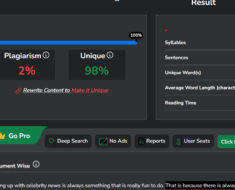The gaming industry is one of the current top entertainment sectors globally. Over the past few years, numerous gamers have seen a significant increase, and the number of gaming accounts has risen consistently. More and more people give a try to video games and mobile games, opening accounts on numerous platforms.
However, due to the neglect of basic cybersecurity measures by many players, hacking into most accounts has become an easy task. People are extremely neglectful of their data security and leave their sensitive data unattended. It is crucial to protect your gaming account to prevent data, funds, and identity theft.
In this post, we discuss data security risks and how to mitigate them.
Threats to Gaming Accounts
Different types of threats from third parties can affect your gaming accounts and your data. If you know more about them you will be more aware of your security measures.
Phishing
You can easily stumble across phishing links right in gaming chats. These links might lead you to a weird login page, and you could unknowingly share your login details or other personal info there. A trade scam can occur when someone tricks you into swapping items with them. Some scammy community members can manually trade sensitive data from you. So, even within the gaming community, fraud can occur.
Cyberbullying
Cyberstalking and cyberbullying are real threats that can happen online and even transfer offline. Toxic behavior happens in various video games but bullying and stalking can result not only in mental health issues but also in checking out your IP address, ascertaining your location, or even recognizing you, leading to harassment on social media and other gaming platforms. If you are unlucky enough, stalkers might even pursue you in real life and this is a huge risk.
A Takeover of Account
When someone illegitimately gets into an account and alters the login details, it is called an account takeover. To achieve this, attackers typically start by swiping login credentials through malware or taking advantage of data breaches and leaks. Once in, they might utilize your skins, gaming rating, or even control the entire game but this is not the worst scenario although it is very distressing. Accounts can be sold to third parties, or the financial information of the initial account owner can be used for further breaches and theft.
The Risks of Malware
Malware can cause delays, lead to system crashes, and trigger various issues that will disrupt gaming experiences and destroy personal devices. Let’s say, keyloggers will infiltrate gaming and social media accounts, extracting login details without consent. Spyware not only gains access to your login information but also delves into your browsing history and various other data. And there is already malware designed specifically for gaming accounts and data.
Why Game Developers Want Your Data
The bad news is that not only fraudulent third parties want your data but game developers as well. Gaming companies monitor all your in-game activities, which means they know more about you than you might want.
Recently, players shared their initial thoughts on specific gameplay mechanics through social media channels. The game’s publisher, in turn, tracked and gathered user data from these interactions and leveraged it for product sales. This practice is transparently outlined in the company’s privacy policy but most people were still not aware of this. This data collection is used for targeted mobile ads.
Even more, gaming platforms now claim that users can only use their services if the platform or software is allowed to collect information about all other services used by the player on the same device. This is what social media like Instagram also do. The gaming publisher claimed that they tracked cheating from some players who use other software products to gain an advantage in games. However, this does not prevent the collection and storage of data vulnerable to data breaches.
How To Reduce Your Online Data Footprint
If you want to continue playing the games you love you should not only take care of your data safety on a specific platform or device. Reducing your general digital footprint across platforms is also a good idea. Below are several tips that will help you do this.
Enable Multi-Factor Authentication On Your Account
Implementing Multi-Factor Authentication (MFA) enhances account security by requiring hackers to possess something you have (like a hardware token or cell phone) or something you are (like your fingerprint), in addition to something you know (such as a password), to gain access to your account details. This way, account breaches become more complicated.
Use Strong Passwords
Numerous internet accounts are compromised and taken over because users invent uncomplicated passwords that are easily remembered or guessed. This makes unauthorized access super easy. Employing unique passwords as a protective measure is an effective way to mitigate potential hacking risks.
Longer passwords, although typically the basic requirement, offer an extra layer of security. Also, users should stop adding any personal information to their passwords, like date of birth.
Some recommend using password managers for creating and storing all the long complicated passwords needed for gaming accounts and all other accounts. This is reasonable but only for reliable paid password managers.
Download Carefully
You should only download software from reputable sources if you want to keep your online gaming account safe. You should always download games from the official website or apps like Epic or Steam, and never opt for third-party platforms offering “early access” or other dubious benefits. Luckily, most gaming and gambling services are not non-downloadable, so if you want to play a video game or make a bet or two at the best paying online casino you just use cloud services and that’s all.
Use VPN Software While Playing
A VPN serves as a privacy tool capable of hiding your IP address, your geographical location, and altering your DNS information. Certain games prohibit players from using VPNs due to location-locked release dates or region-locked in-game items. However, when possible, it is better to use VPNs.




